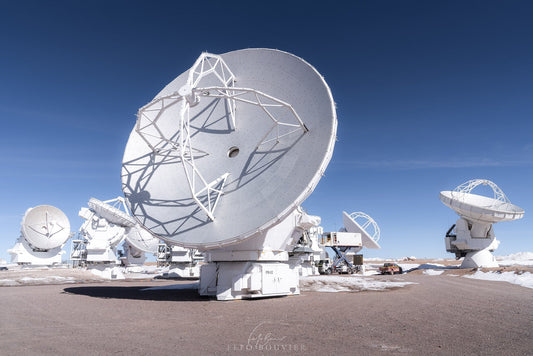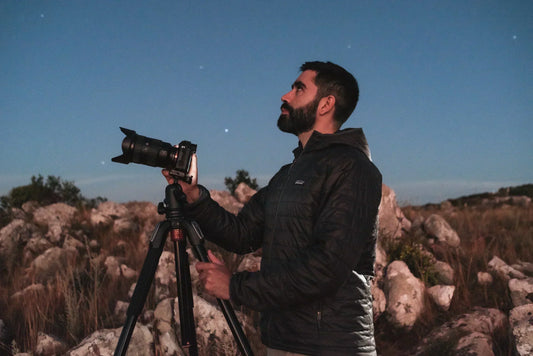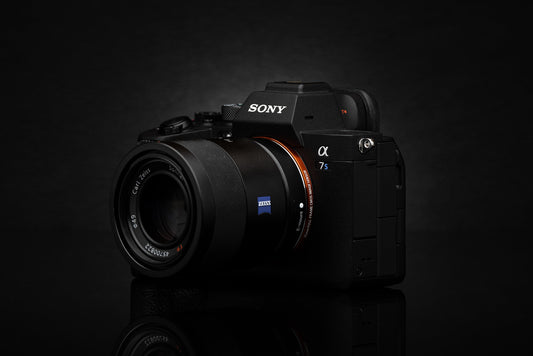Have you ever wanted to give a telescope as a gift but didn't know where to start? Or, let's be honest, fulfill your own desire to explore the Universe? This is one of the questions I get most often: Fefo, what telescope should I give my kids for Christmas? The truth is, the excitement of seeing the stars through a telescope is ageless. Whether we're children, teenagers, adults, or senior adults, the unique experience of observing the Moon, the planets, or even galaxies brings the whole family together under the same sky.
But when you start looking for telescope options in Uruguay, questions quickly arise: Which model should I choose? Is it better to buy locally or import? How do I avoid overspending on equipment that doesn't meet my expectations? Don't worry, I'll answer all those questions in this guide.
I'll tell you:
- What are the ideal telescopes for beginners (so you avoid buying a hobby killer).
- Step-by-step instructions for importing telescopes into Uruguay without any customs issues (it's easier than it seems!).
- And a tip to get an additional discount on your purchase.
Buying a telescope can seem complicated at first, but with a little information, it's easier and more affordable than you think. Get ready to give your family (or yourself) an unforgettable gift!
🗂️ Table of Contents
- What you need to know before buying a telescope in Uruguay
- Buy locally or import?
- Methods for importing telescopes into Uruguay
- Buy on Amazon and use a courier
- Using Tiendamia: the easiest option
- About import and shipping costs
- How to get a discount with a Tiendamia Uruguay coupon
- Recommended telescopes for beginners
- Recommended binoculars
- Recommended astrophotography equipment
What you need to know before buying a telescope in Uruguay
Buy locally or import?
Since there are no telescope factories in Uruguay, all equipment available on the local market has been imported. This means that its price includes not only the cost of the telescope and import fees, but also an additional margin for the handling of the equipment by the company or individual who brought it to the country.
If you're looking for the best price, a good option is to handle this process yourself. Although it may sound complicated, the reality is that importing a telescope (or any product) is easier than it seems.
Methods for importing telescopes into Uruguay
-
Buy on Amazon and use a courier
The most recommended brands, like Celestron, have their main market in the United States and sell primarily through Amazon. From Uruguay, it's not possible to receive your purchase directly at home. Therefore, you'll need to use a courier (a parcel service) if you don't want your telescope to end up stuck in customs.
The process works like this:
- You buy the telescope on Amazon and send it to the courier's address in the United States.
- You inform the courier of your purchase and coordinate shipping from their warehouse in the U.S. to Uruguay.
- You pay the courier fee, which includes import costs and transportation to your door.
Although this method can be a bit more cumbersome, some people prefer it. That's why I'm including links to Amazon.
-
Using Tiendamia: the easiest option
If you prefer to avoid paperwork and coordinate shipping, Tiendamia is the most convenient option. This online store in Uruguay allows you to access Amazon products, taking care of everything: from import procedures to delivery to your home.
The process is simple:
- Choose your telescope at Tiendamia and add it to your cart.
- Before paying, you can see the final costs, which include the product price, import fees (if applicable), and shipping.
- You confirm the purchase and just wait for the telescope to arrive at your door without having to deal with couriers or customs.
Purchasing is easy, fast, and secure, with just a few clicks and delivery to your doorstep, without having to go through customs. The price you see when you pay is the final price. No surprises.
From my own experience, I can say that Tiendamia is trustworthy and that if you have any problems, they will refund your money.
About import and shipping costs
When you import a telescope (or any product) to Uruguay, the final cost depends on two main factors: the purchase price and the weight of the package. Here, I'll explain the two possible scenarios:
-
Purchases up to USD 200 (deductible)
Uruguay has a duty-free regime that exempts import taxes on purchases of USD 200 or less. Each Uruguayan citizen can use this duty-free regime up to three times a year, provided they meet the following requirements:
- Be of legal age (+18 years).
- Purchase with a Uruguayan identity card.
- The order holder must match the cardholder used to pay.
If your telescope falls within this range, it's a great opportunity to save on taxes.
- Purchases over USD 200 (taxes apply)
When the value of your purchase exceeds USD 200, import taxes apply. There's no limit on the number of purchases per year, but you must register your ID card or RUT (for businesses). If you're a business, you can also deduct VAT.
An important factor when importing telescopes is that they tend to be bulky and heavy, which significantly increases shipping costs. The rate is not fixed and is calculated per kilo.
How to get a discount with a Tiendamia Uruguay (and Tiendamia Argentina) coupon
If you shop at Tiendamia, you can save by applying these coupons at checkout:
- FEFO-MIA | 10% discount on your first franchise purchase (less than or equal to USD 200) at Tiendamia. This discount applies to the total cost of the products in a single purchase.
- IMPORTS-FEFO | A USD 25 discount for import purchases over USD 200 in a single purchase, which doesn't necessarily have to be the first.
The FEFO-MIA coupon also works at Tiendamia Argentina, giving you 10% off your first purchase.
Recommended Beginner Telescopes in 2025
If you're looking to observe celestial objects and enjoy clear, detailed images of the sky, you need a telescope that lives up to those expectations, which requires a budget to match. A telescope that's too cheap can end up being disappointing and poorly functional, detracting from the real astronomy experience.
Below, I've listed several options that, from lowest to highest price, offer excellent value and won't disappoint.
Celestron PowerSeeker 80AZS TelescopeThe Celestron PowerSeeker 80AZS telescope is ideal for beginners: easy to use, portable, and powerful. Perfect for observing from the backyard, a campsite, or under dark skies. It includes a smartphone app that helps you easily find astronomical objects. It's ideal for viewing celestial objects closer to Earth, such as the Moon and planets.  |
🔗 Buy at Tiendamia (cost breakdown below) Price on Amazon USD 179.95 |
Celestron StarSense Explorer LT 80AZ TelescopeThis telescope combines good quality with an affordable price, positioning itself as one of the best budget options available on the market. It includes a smartphone app that helps you easily locate astronomical objects. It's ideal for viewing celestial objects closer to Earth, such as the Moon and planets.  |
🔗 Buy at Tiendamia (cost breakdown below) Price on Amazon USD 196.69 |
ZWO Seestar S50 Smart TelescopeSmart telescopes are different from other telescopes because there's no way to look through them. Instead, everything is on your phone. You can take your own images of galaxies, nebulae, the Moon, and the Sun (using a special filter), and everything is automated using an app on your smartphone, so you don't need to be an expert. Through astrophotography, you'll be able to see objects with greater clarity and detail than with the naked eye.  |
🔗 Buy at Tiendamia (cost breakdown below) Price on Amazon USD 549.00 |
Celestron NexStar 4SE TelescopeThis motorized telescope can automatically find objects in the night sky, saving you the trouble of finding them yourself. It's perfect for getting high-magnification, detailed views of the Moon's craters, Saturn's rings, Jupiter's cloud bands and moons, and some brighter nebulae.  |
🔗 Buy at Tiendamia (cost breakdown below) Price on Amazon USD 649.00 |
Recommended binoculars in 2025
If you're passionate about astronomy or night sky photography, binoculars can be a surprisingly useful tool. Unlike a telescope, they're lightweight, easy to carry, and allow you to explore the sky with a wide, natural view. They're ideal for observing constellations, star clusters, the Milky Way, the Moon, and events like eclipses or comet appearances without the need for assembly or alignment. Additionally, binoculars provide excellent companionship for us astrophotographers when we spend long hours under the starry sky capturing our shots. With them, you can discover the sky in a more intuitive and spontaneous way, without technical complications.
These are the binoculars I use and recommend.
Celestron Trailseeker 8x42 ED BinocularsThese wide-field binoculars are constructed with the finest materials and are super bright. They're waterproof and treated to prevent fogging. The perfect companion for my astrophotography nights. Ideal for observing constellations, neighboring galaxies, star clusters, comets, and the Moon. They're also a great choice for birdwatchers and nature lovers.  |
|
Tripod Adapter for Celestron BinocularsThis adapter allows you to mount your Celestron binoculars on a tripod for greater stability and comfort. You won't believe the difference it makes to use binoculars with a stable support instead of holding them in your hands.  |
🔗 Buy at Tiendamia (cost breakdown below) Price on Amazon USD 15.59 |
Recommended astrophotography equipment
🔗 To see my recommendations for astrophotography gear, click here for a no-secrets list of the gear I currently use for nightscapes, Milky Way photography, the Moon, and more.
Note: To maintain accurate information, this article is updated regularly. Prices can change at any time, so it's recommended to check the websites of the stores mentioned for the current rates. The latest update to this article can be found under the title.
Disclosure: As a Tiendamia and Amazon Associates affiliate, I earn a small commission for each qualifying sale made through the coupons and links I provide in this article. These commissions go toward funding my work as an astrophotographer and advocate for the night sky year-round. Thank you for your support!






2 comments
En respuesta a Pablo: yo creo que si conseguís un adaptador tipo T-ring para ese tamaño de ocular y tu cámara réflex podrías acoplarla. El problema es que solo podrás hacer exposiciones muy cortas dado que no tiene un sistema de seguimiento de los astros. Pero podrías conseguir buenas fotos de un astro brillante como la Luna.
Hola!
¿Cómo va Fefo?
¿Al StarSense Explorer LT 80AZ se le puede colocar una réflex para sacar fotos? ¡Gracias!
Saludos,